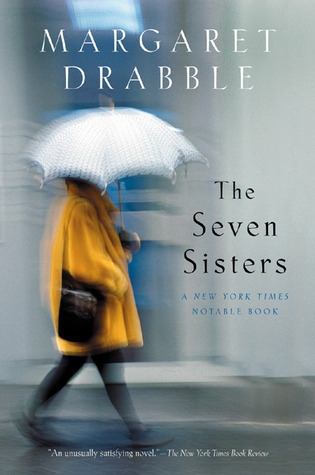What would literary heroines of old have done without an inheritance? Would Jane Eyre have met Rochester again on her own terms? Would Isabel Archer have been the prey of Gilbert Osmond? This popular nineteenth-century plot device was not merely a convenience but almost a necessity for authors to mobilize their female characters in times when they had no other capacity for agency. Margaret Drabble’s latest novel, The Seven Sisters, presents us with another idiosyncratic female heroine who receives a timely inheritance: fifty-five-year-old Candida Wilton of the twenty-first century, an incredibly anachronistic and almost appallingly insulated woman who has never worked a day in her life and is not about to start. She chooses to move from Suffolk to London after a divorce, learns to use a computer (“this modern laptop machine”), swims at the gym, visits a convicted prisoner, and buys her first lottery ticket—and yet Candida keeps insisting that she is a passive person.
Drabble does not shy away from unsympathetic heroines. She may be most notable for editing the Oxford Companion to English Literature, but she is most notorious for her cool relationship, or lack thereof, with her elder and more famous novelist sister, A.S. Byatt. Drabble has also written fourteen novels in addition to The Seven Sisters, but none of them seem likely candidates for a movie; nor do any of her characters suggest Gwyneth Paltrow. Certainly, the unprepossessing Candida resists any Hollywood apotheosis.
Candida, as she herself remarks continually, wallows in alternating bouts of self-pity and self-deprecation, uttering grand and absolutely ridiculous statements like, “Nothing much happens to me now, nor ever will again.” Like the female protagonist Jane Gray in one of Drabble’s earlier works, The Waterfall, Candida likes to manipulate her narrative (her computer journal) to her own ends of self-representation, all along declaring how brutally honest she is being with herself. She wonders about all the “coloured people” now in her line of vision, and how they have money to buy things. Physically pallid (candida means white in Latin) and emotionally frigid, she understandably hates the more socially adept husband who betrays her, but her posture of utter indifference to the three daughters she raised, and whom she calls “fearsome little snobs,” is unconvincing. Her attitude towards her friends is similarly repellent. “I allowed two women to befriend me,” she says of her erstwhile companions in Suffolk, whom she gives the charitable epithets “fat Sally and bony Henrietta.”
Once in colorful London, Candida makes new, more glamorous friends when she takes an evening class on Virgil’s Aeneid. After the takeover of her College of Further Education by a Health Club, Candida receives a surprise inheritance that allows her to take a trip tracing the path of Aeneas from Carthage to Italy along with an old school friend named Julia, two of her Virgil classmates Ana*s and Cynthia, their former teacher Ida Jerrold, the unforgivably fat Sally, and the most improbable bus driver, a beautiful, Ethiopian-Italian woman named Valeria, who just happens to have done postgraduate work at Cornell. That so many of the women have classical names is no coincidence. Together they compose the eponymous Seven Sisters, an allusion to the myth of the Pleiades pursued by Orion and made into a constellation, as well as the name of a train station on the way into London.
The Seven Sisters argues for the beauty and relevance of myth and literature, even in the contemporary life of a middle-aged woman far away in time and sensibility from Aeneas and Dido. The women’s Aeneid expedition is the highlight of the book: magical, poetic, bright, expansive, and in a third-person voice that ought to have been used for the entire novel. Instead, both Drabble and her heroine Candida must play around with perspective in over-explanatory, and generally non-illuminating narrative reconstructions. Candida’s first-person section sags especially. The narrative device of the journal allows for too much sloppy writing and a tiresome style, weighted by a preponderance of rhetorical questions, such as “Young people today don’t speak very well, do they?” and “I wasn’t paid to be a school matron, was I?” Various plot lines and characters, like her old friend Henrietta and the convicted rapist and murderer whom Candida visits, are only glanced at, making one wonder why they are in the novel at all, since they are used to almost no effect. The episodes with the nameless convict, especially, could have borne fruit, as Candida seems to feel more comfortable in the company of a violent criminal behind bars than with any other male.
As in her other novels, whether preoccupied with feminism or Thatcherite England or Latin poetry, Drabble is intellectual to a fault. Her protagonists often seem like mere vehicles for reflective rambling, for the author endows them much too generously with the kind of self-centered hyperawareness that should only be available to an omniscient narrator. Candida is no exception, and she is indeed a pale figure compared to the intricate and fascinating details of her surroundings, London as well as Naples. Drabble deftly observes everything from the addictive properties of computer Solitaire, to the myth of a charming dentist, and the complete satisfaction of parsing the Latin word oblite in context as the vocative singular masculine of the perfect participle of the verb oblivisci, to forget. The Seven Sisters at times reads like an elaborate plea for an impious age not to forget the importance of the classics, and, in this message at least, is vividly successful.

